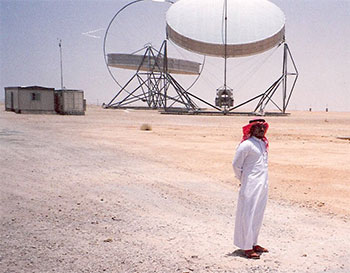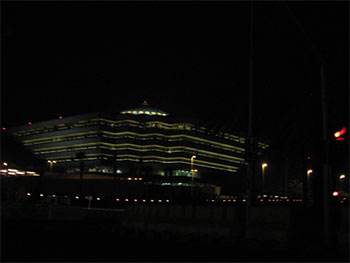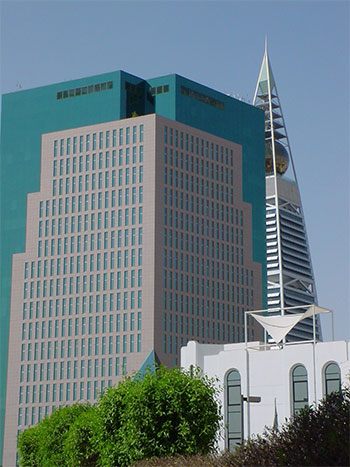The Arab Spring spared The Kingdom of Saudi Arabia the level of protest seen in neighbours such as Bahrain. But that does not mean it passed completely unnoticed. The government of Saudi Arabia recognised it had a young population with high levels of unemployment – the kind of demographic ideal for fomenting dissent.
This was not a new realisation – a rapidly growing population and an economy based around the relatively low-employment petroleum industry were indicators that had been blinking for a number of years. But the Arab Spring crystallised the need for action.
But outside security issues, what impact did the Arab Spring have for investors looking at Saudi Arabia? In essence, it means expanding opportunities in a number of sectors including manufacturing, education, healthcare and, most importantly, renewable energy as well as housing and infrastructure construction.
“Saudi Arabia is the biggest economy in the Middle East, and although it did not experience the Arab Spring directly, it has acted to address some of the underlying causes of discontent across the general population,” says Hani Ashkar, Middle East deals leader and Saudi Arabia country leader for consultancy PwC.
Time To Expand Employment Opportunities
Step number one for the Kingdom is reducing the high unemployment levels. There are approximately 2M unemployed Saudis in the country and 2.5M foreigners working in the country, says Ashkar.
But it is not so much a simple case of expelling all foreigners and giving the jobs to citizens. A Majority of the foreigners do work that Saudi Arabians would not want to do. “Many foreigners are drivers, for example, and that’s probably the least undesirable job. Others work in areas such as construction and cleaning,” he adds.
The government is attempting to address this by creating new job opportunities and increasing education, especially at the university level. For example, it has created the Princess Noura Bint Abdulrahman University for women and the King Abdullah University of Science and Technology to further tertiary education amongst the population.
Meanwhile the Kingdom could become an automotive manufacturing centre to increase job opportunities. Japanese car and truck maker Isuzu has already opened an assembly facility, which was inaugurated in December last year. The firm anticipates the plant will produce 600 trucks this year and predicts it will be assembling 25,000 by 2017.
The plant currently only assembles vehicles made from imported parts, but it intends to start manufacturing spare parts in the future and may eventually manufacture assembly components in the country as well.
Isuzu is not the only car manufacturer interested in setting up in Saudi Arabia. Tata, the Indian automotive firm, is looking at the Kingdom as a location for a Jaguar-Land Rover assembly facility.
The country offers cheap power, land and a strong domestic and local export market within the Gulf Cooperation Council (GCC) countries. PwC estimates that Saudi Arabia accounts for 700,000 new cars every year and that the entire GCC region is a 1.2- to 1.3-M unit marketplace.
Saudi Arabia will also soon have some of the cheapest aluminium in the world. Last year, one of the largest aluminium production complexes was opened as a joint venture between Alcoa and Saudi Arabian Mining Company, Ma’aden. The US$10.8-billion facility is expected to be fully online in 2014 and will comprise a bauxite mine, alumina refinery, aluminium smelter and aluminium rolling mill.
Time for New Energy Policies
But in order to continue growth in manufacturing and other job creating industries, Saudi Arabia will need to wean itself off oil. The country has not produced more than 10M barrels of crude oil per year since 1980. But domestic consumption has risen from 600,000 to over 2.5M in the same timeframe, according to figures from national statistic compiler, Index Mundi.

Solar energy research centre near Riyadh Saudi Arabia
Photo courtesy of Martin Prochnik
Saudi Arabia now has the world’s highest energy consumption per capita. And because the Saudi government sells oil at approximately $5 per barrel domestically compared to the hundred-some dollars it gets on the international market, it has a significant financial incentive to cut domestic usage. It plans to do this by harnessing renewable energy, which has ample potential for domestic use but is difficult to export, says Ashkar.
Nimer Abu Ali, Middle East and North Africa (MENA) head of cleantech for consultancy Ernst and Young adds: “Saudi Arabia hopes that in addition to using renewable energy to help meet rising electricity demand, it will also reduce its domestic use of crude oil and hence release additional oil capacity for exports.”
The firm rates Saudi Arabia as the leader (along with the United Arab Emirates) for renewable energy over the coming years. The country plans to spend $109 billion on installing 41GW of solar production capacity and 9GW of wind production capacity by 2032. The country has high solar radiation of around 2,550kWh per metre squared per year as well as large stretches of open land and vast deposits of clear sand needed for manufacturing silicon PV cells, says Abu Ali.
The Kingdom also has better wind potential than much of the GCC with 4.9 hours of full–load wind per day on average, he adds.
But there are still technical issues to overcome. The country needs to improve its electricity infrastructure in preparation for the increased renewable connectivity, and it needs help in solving problems such as dust and wind-blown grit, which can interfere with solar arrays and wind turbines.
Foreign renewable energy specialists such as First Solar will be able to help. First Solar recently became a shareholder member in Dii – the Desertec industrial initiative, a private consortium aiming to create renewable energy installations in the Middle East in anticipation of this and other MENA renewable energy opportunities.
“Saudi Arabia’s consistency in the development of power projects bodes well for clean energy expansion in the country,” adds Abu Ali.
Time for New Housing Options
But unemployment is not the only cause of disaffection amongst the population. Many Saudis also dream of owning property, an ambition that is beyond most household’s budgets. Ernst and Young estimates that Saudi Arabian residual income – the household income left after paying for housing – is one of the lowest in the GCC region. In order to address this, and the country’s rapidly increasing population, the government of Saudi Arabia plans to overhaul the housing sector.
It intends to increase significantly construction of apartments as these are more affordable for the average Saudi but in limited supply. The country will need to turn to the private sector in order to do this.

Minstry of Interior Riyadh
Photo courtesy of Andrew A
But the Kingdom will focus on more than construction in addressing the affordability of housing. It also intends to create opportunities for foreign firms to invest in financing, mortgages and Islamic banking in order to make purchasing a house more accessible. These are areas that have remained undeveloped due to issues with Islam and lending but now offer significant potential, says Ashkar.
As the country addresses short-term requirements and creates domestic opportunities for foreign investment, it is also looking to the future. Its rapidly expanding population is also ageing at an increasing pace. And as it gets older, its healthcare requirements are going to increase. In anticipation of this, the country is looking for foreign firms specialising in all areas of the medical field – from hospital construction, to running clinics, to training and the provision of supplies.
Working in Saudi Arabia is not necessarily easy. There are strict visa requirements and, as recent cases have shown, a healthy bribery culture still exists
Meanwhile, Saudisation – the policy to create more job opportunities for Saudi nationals – can increase costs. Firms may have to hire an equivalent number of Saudi employees as foreign employees, and they may require training or be inexperienced. “This is perhaps the biggest challenge for foreign firms,” says Ashkar. But given the myriad sectors in which opportunities exist, it is likely one that firms will be glad to take on.
Rob Denman is Editor in Chief and CEO of London-based Pathfinder Business.
